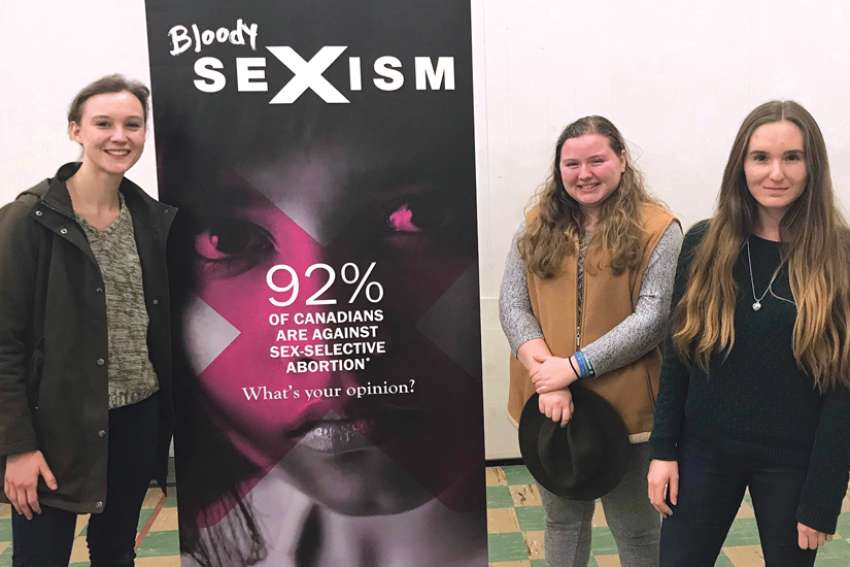“It’s the anger that we need,” remarked the co-leader of the five-member club established last October. “There are so many people on campus that don’t care. That’s a danger. We’ll ask, ‘what’s your opinion on sex-selective abortion,’ and they’ll say, ‘I don’t have an opinion,’ and walk away.
“We can’t live without opinions. We all need to have an opinion. When there are people who say, ‘no, I am pro-choice,’ they are willing to talk about their views with us, and that is really good.”
Bezooyen spoke about the early successes of the club, and the trials they face, at a public fund-raising presentation hosted by the National Campus Life Network (NCLN) at St. John the Evangelist Catholic Church on Jan. 31. This function, which drew close to 20 attendees, concluded the Calgary stop on the second leg of the NCLN’s national Momentum Tour.
After touring various Ontario communities with post-secondary campuses on the first leg of the tour in October, the NCLN, a non-profit focused on supporting university student pro-life movements, is spending the early part of 2020 trekking through British Columbia, Alberta and Saskatchewan. The goal is to inspire more students to join its pro-life clubs and to raise funds to support the NCLN mission.
In addition to staging these seminars in front of potential donors, the NCLN is conducting pro-life club training sessions and engaging in on-campus or near-campus activism. During the stop in Calgary, NCLN executive director Ruth Shaw and the organization’s Saskatchewan Provincial Co-ordinator Philip Ottenbrait worked alongside Bezooyen and fellow MRU club members Farrah MacPherson and Nadja Kunz in engaging in conversations with students.
Understanding that younger generations catalyze social change, the NCLN, founded in 1997, is heightening its focus on recruiting and training students willing to battle against censorship as they encourage their peers to adopt a pro-life stance.
The group scored a major court victory last month when the Alberta Court of Appeal sided with a pro-life group at the University of Alberta campus in claiming a security fee imposed by the university violated its Charter right to freedom of expression.
“It is no secret that in Canada there is a lot of campus censorship,” said Shaw in her keynote address. “Administrative censorship is extremely annoying, and it is discriminatory all the way up to being overcharged for security fees for being on campus to do public pro-life work.
“It is critical for us as an organization to train our young people to be passionate and persistent in a challenging environment,” said Shaw.
MacPherson said the MRU Pro-Life Club is continually facing suppression in the first five months of its existence.
“When we have put posters on the wall, people have torn them down,” said MacPherson. “We have also had issues with the campus club co-ordinator when it comes to booking tables. It has been kind of blamed on scheduling, but we are thinking that it was done on purpose to prevent us from coming out and having conversations with people.”
Bezooyen told the crowd at the NCLN event that someone posted a notification earlier in the week on one of the Mount Royal student Facebook pages to warn the student body that the “pro-lifers” were at work.
“That message sparked a whole discussion about why we were there,” said Bezooyen. “One student wrote, ‘how dare they,’ and another wondered how we had the time at school to push our views on everybody.”
However, Bezooyen added that some students posted messages that argued the club should have the same free speech rights as other advocacy groups.
Shaw said she and the rest of the NCLN team are keen to help the MRU club in the journey ahead, as well as the active program at the University of Lethbridge. Other organizational objectives in Alberta include providing leadership to a University of Alberta pro-life student program “in transition” and establishing an anti-abortion club at the University of Calgary.
The NCLN is completing this recruitment drive at a time when momentum is growing. Shaw said the “clubs have doubled in (participation) numbers” over last year with an an average of five to 10 students per club at 21 campuses.


